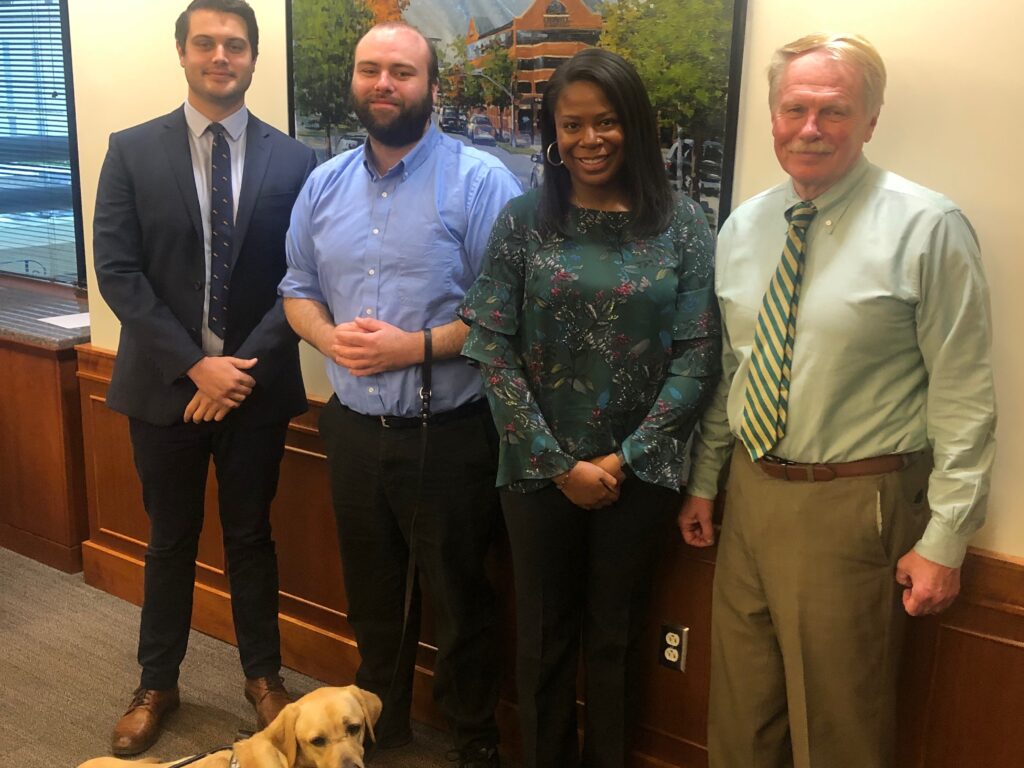Servant Leadership: The Wallace Student Fellowship Program

Upon entering the foyer of the Norman Adrian Wiggins School of Law, one could not help but to notice the following expression of commitment displayed on the wall: “He has showed you, O man, what is good. And what does the LORD require of you? To act justly and to love mercy and to walk humbly with your God.” This statement, taken from the sixth chapter and eighth verse of the book of Micah in the Bible, declares a fundamental piece of wisdom that must be understood in order to be a successful lawyer. One must live justly, love mercy, and walk humbly with God. The question then becomes: how?
Campbell Law School’s vision declares, in part, that it aims to develop attorneys “who view the practice of law as a calling to serve others and to create a more just society.” In accordance with this most noble and worthy goal, Campbell Law School has time and time again demonstrated a commitment to developing attorneys who embody the ideal of the “servant-leader.” In keeping up with this Campbell tradition, Campbell Law Dean J. Rich Leonard announced the creation of three full-time employment opportunities for recent graduates in September of 2015. These opportunities would collectively be called the Wallace Fellowship Program. Campbell Law has three fellows: the Wallace Advocacy Fellow, the Wallace Leadership Fellow, and the Wallace Public Service Fellow. These three fellowships are named in honor of Campbell University Chancellor and former President Dr. Jerry M. Wallace. Fellows are selected annually from the graduating class, and Chancellor Wallace is deeply involved in the selection process.
An ordained Baptist minister and a Rockingham, North Carolina native, Dr. Jerry Wallace joined Campbell in 1970 as an adjunct sociology professor while serving as a pastor of Elizabethtown Baptist Church. He began teaching full time at Campbell in 1975 and went on to serve as chair of the Department of Religion and Philosophy, dean of the College of Arts & Sciences, director of graduate studies, and vice president for academic affairs and provost. In May of 2003, following the retirement of longtime president Dr. Norman Adrian Wiggins, Dr. Wallace was named Campbell University’s fourth president. After serving as president for 12 years, he eventually stepped down from the position on June 30, 2015 before serving as the current Chancellor. Today, as chancellor, Dr. Wallace advises President Creed and other senior leaders on university initiatives.
In an interview for this article, Chancellor Wallace described the Wallace Fellowship program as an opportunity to further educate recent graduates on how to become leaders in both their personal and their professional lives. To this end, the Wallace Fellowship seeks to further cultivate recent graduates into “servant-leaders,” which Chancellor Wallace describes as “those who believe that you must serve before you can lead.” Chancellor Wallace further explained how the Wallace Fellowship program meets the needs of today’s legal market: “We are in need of a new leadership model that will change things for the better of humanity. There are many opportunities in the legal community. We need individuals who will go beyond just being leaders, but will truly seek to help other people.”
The Wallace Fellowship program enables recent graduates to further expand upon the notion of “servant-leadership” within the context of understanding one’s own “calling.” When asked to explain this concept of one’s “calling,” Chancellor Wallace noted that a calling manifests itself in various ways. “It can be a passion to do something. It is compelling, persuading. Each person has a sense of it, even if they cannot fully articulate it. In a spiritual sense, you feel that God is leading you to do something for His glory.”
Chancellor Wallace explained that in order to be successful as a Wallace Fellow, one must be fully committed to spending the next year exploring the notion of “servant-leadership,” be committed to being both teachable and open to learning through doing, and one must be willing to curiously ask themselves: what motivates my life? The Fellowship creates a space for fellows to develop an awareness of the things that they do daily, helping them to see what opportunities for service are out there, and to be courageous and confident enough to tackle these challenges.
In remarking about the ideal “servant-leader,” Chancellor Wallace could not help but to recount fond memories of his dear friend, Dr. Norman Adrian Wiggins. “He was a moral person. Very bright, compassionate. He had a gift for encouraging people to be their best, but the wisdom to know how to give them the space that they needed to grow and to perform,” Chancellor Wallace explained. “Part of being a ‘servant-leader’ is surrounding yourself with good, smart, moral people. Dr. Wiggins did just that. He surrounded himself with intelligent people with good hearts, and he taught others how to lead together as a team.” Chancellor Wallace went on to reveal how in his own life, Dr. Wiggins had been a great inspiration and encouragement to him.
The Wallace Fellowship program seeks to build upon Campbell Law School as an “opportunity school,” Chancellor Wallace explained, “We make the very finest lawyers. We find in students their abilities and develop them. Ability and courage development; we respond to what’s there.”
The Wallace Fellowship program is a very unique occasion that offers recent Campbell Law graduates who have passed the North Carolina Bar Exam the opportunity to spend one year working beside various accomplished “servant-leaders” within the Campbell Law community, including Dean J. Rich Leonard, members of Campbell Law’s faculty, and Chancellor Wallace himself. Through mentorship, guided reflection, and hands-on experience, the Wallace Fellowship program meets the needs of today’s demanding legal market by further producing thoughtful and courageous lawyers who are willing to place service to others – and the betterment of humanity – above all else.
